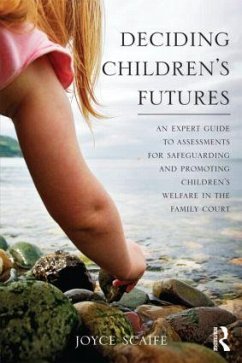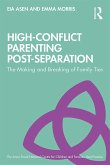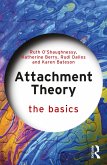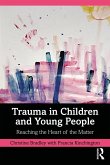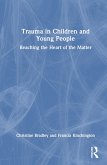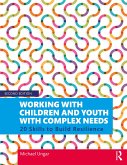Joyce Scaife
Deciding Children's Futures
An Expert Guide to Assessments for Safeguarding and Promoting Children's Welfare in the Family Court
Versandkostenfrei innerhalb Deutschlands
58,99 €
inkl. MwSt.
Versandkostenfrei*
Liefertermin unbestimmt
Melden Sie sich
hier
hier
für den Produktalarm an, um über die Verfügbarkeit des Produkts informiert zu werden.
oder sofort lesen als eBook

29 °P sammeln
Joyce Scaife
Deciding Children's Futures
An Expert Guide to Assessments for Safeguarding and Promoting Children's Welfare in the Family Court
- Broschiertes Buch
This book addresses the assessessment of parents and children of struggling families where there are issues of neglect or harm, and separating parents are contesting arrangements for their childrenâ s care.
Andere Kunden interessierten sich auch für
![Deciding Children's Futures Deciding Children's Futures]() Joyce ScaifeDeciding Children's Futures37,99 €
Joyce ScaifeDeciding Children's Futures37,99 €![High-Conflict Parenting Post-Separation High-Conflict Parenting Post-Separation]() Eia AsenHigh-Conflict Parenting Post-Separation26,99 €
Eia AsenHigh-Conflict Parenting Post-Separation26,99 €![Attachment Theory Attachment Theory]() Ruth O'ShaughnessyAttachment Theory19,99 €
Ruth O'ShaughnessyAttachment Theory19,99 €![Trauma in Children and Young People Trauma in Children and Young People]() Christine BradleyTrauma in Children and Young People36,99 €
Christine BradleyTrauma in Children and Young People36,99 €![Trauma in Children and Young People Trauma in Children and Young People]() Christine BradleyTrauma in Children and Young People137,99 €
Christine BradleyTrauma in Children and Young People137,99 €![The Routledge Handbook of Attachment The Routledge Handbook of Attachment]() The Routledge Handbook of Attachment52,99 €
The Routledge Handbook of Attachment52,99 €![Working with Children and Youth with Complex Needs Working with Children and Youth with Complex Needs]() Michael UngarWorking with Children and Youth with Complex Needs37,99 €
Michael UngarWorking with Children and Youth with Complex Needs37,99 €-
-
-
This book addresses the assessessment of parents and children of struggling families where there are issues of neglect or harm, and separating parents are contesting arrangements for their childrenâ s care.
Hinweis: Dieser Artikel kann nur an eine deutsche Lieferadresse ausgeliefert werden.
Hinweis: Dieser Artikel kann nur an eine deutsche Lieferadresse ausgeliefert werden.
Produktdetails
- Produktdetails
- Verlag: Taylor & Francis Ltd
- Seitenzahl: 400
- Erscheinungstermin: 5. Oktober 2012
- Englisch
- Abmessung: 226mm x 152mm x 25mm
- Gewicht: 598g
- ISBN-13: 9780415596343
- ISBN-10: 0415596343
- Artikelnr.: 36029462
- Herstellerkennzeichnung
- Libri GmbH
- Europaallee 1
- 36244 Bad Hersfeld
- gpsr@libri.de
- Verlag: Taylor & Francis Ltd
- Seitenzahl: 400
- Erscheinungstermin: 5. Oktober 2012
- Englisch
- Abmessung: 226mm x 152mm x 25mm
- Gewicht: 598g
- ISBN-13: 9780415596343
- ISBN-10: 0415596343
- Artikelnr.: 36029462
- Herstellerkennzeichnung
- Libri GmbH
- Europaallee 1
- 36244 Bad Hersfeld
- gpsr@libri.de
Joyce Scaife is a clinical psychologist with over 15 years of experience in carrying out assessments for the family court. She is former Director of Clinical Practice for the Doctor of Clinical Psychology training course at the University of Sheffield.
Preface. Acknowledgements. Introduction. Being Assessed. Feelings
Associated with Assessment. Confidence and Trust. Relationship, Alliance
and Temptation to 'Rescue'. Confidentiality. A Focus on Strengths. Art or
Science, Analytical or Intuitive Judgement, Quantitative or Qualitative
Methods? Fairness. Overall Process of Assessment. What can go Wrong and How
to Avoid it. Skills. Interviewing. Issues in interviewing. Purpose of
Interviews. The Role of Checklists and Formal Structures for Interviewing.
Reflecting Purpose in the Start of the Interview. The Continuing Interview.
Characteristics of Respondents. Bearing in Mind that we are More Similar
than Different and our Lives Could Have Followed a Similar Path.
Assessment of Personality, Profile and Relationship Context. Personality
Traits and Psychological Profile. Characteristics and Issues that Impact on
Parenting Skills. Aspects of Profiles Relevant to Family Proceedings.
Assessing Motivation to Change. Assessment of Social Support. Assessment of
Couple Relationships. Domestic Violence. Special Issues in the Assessment
of Adults. Mental health difficulties. Drug or alcohol misuse. Physical
Impairment. Learning Difficulties. Assessment of Parenting. Precautions.
What Matters in Parenting? Sources of Evidence. A Framework for the
Assessment of Care-giving. Formal Assessment Measures of Parenting.
Prioritising Data in Assessments of Care-giving. Interventions and Sources
of Support. Assessment of Children and Young People. Introduction.
Legislation and the Voice of the Child. Making Sense of Behavioural
Indicators. Interviewing Children. Structured Approaches to the Assessment
of Children. Assessment of Attachment. Attachment and learning theories.
Piaget's Theory of Learning. The Impact of Infant Temperament. Parental
Factors Affecting the Development of Attachment and Categorisations of
Attachment Style. Adult Attachments. Attachment Disorder Critiques of
Attachment Theory. Attachment in Practice - Relevance to Safeguarding.
Assessment of Attachment. Attachment and Contact with Birth Family.
Assessment of Care-giver Sensitivity Implications of Attachment Theory for
Placement. Continuity of Attachment. Risk, Safety, ProtectiveFactors and
Needs Assessment. Rationale for Conducting Assessments of Risk, Safety,
Protective Factors and Needs. Breaking Bad News. Assessments of Safety. The
Epidemiology of Child Abuse and Neglect. Actuarial and Consensual Risk
Assessment Tools. Decision Tree Methods - HCR-20. Aims of Risk Assessment.
Approaches to Assessing Strengths, Needs and Protective Factors. Structured
Decision Making. Placement, Residence and Contact Arrangements. Issues in
deciding placement. Types of Alternative Placement and Factors Related to
Outcomes. The Decision to Place Siblings Together or Apart. Contact with
Birth Families. Private Law. Theoretical Considerations, Data Synthesis and
Formulation. The Meaning of Information. Theoretical Considerations.
Organisation of Material. Strategies for Data Analysis and Synthesis. The
Family's Understanding and Explanations.Case formulation. In conclusion.
Postscript. References. Glossary. Appendices.
Associated with Assessment. Confidence and Trust. Relationship, Alliance
and Temptation to 'Rescue'. Confidentiality. A Focus on Strengths. Art or
Science, Analytical or Intuitive Judgement, Quantitative or Qualitative
Methods? Fairness. Overall Process of Assessment. What can go Wrong and How
to Avoid it. Skills. Interviewing. Issues in interviewing. Purpose of
Interviews. The Role of Checklists and Formal Structures for Interviewing.
Reflecting Purpose in the Start of the Interview. The Continuing Interview.
Characteristics of Respondents. Bearing in Mind that we are More Similar
than Different and our Lives Could Have Followed a Similar Path.
Assessment of Personality, Profile and Relationship Context. Personality
Traits and Psychological Profile. Characteristics and Issues that Impact on
Parenting Skills. Aspects of Profiles Relevant to Family Proceedings.
Assessing Motivation to Change. Assessment of Social Support. Assessment of
Couple Relationships. Domestic Violence. Special Issues in the Assessment
of Adults. Mental health difficulties. Drug or alcohol misuse. Physical
Impairment. Learning Difficulties. Assessment of Parenting. Precautions.
What Matters in Parenting? Sources of Evidence. A Framework for the
Assessment of Care-giving. Formal Assessment Measures of Parenting.
Prioritising Data in Assessments of Care-giving. Interventions and Sources
of Support. Assessment of Children and Young People. Introduction.
Legislation and the Voice of the Child. Making Sense of Behavioural
Indicators. Interviewing Children. Structured Approaches to the Assessment
of Children. Assessment of Attachment. Attachment and learning theories.
Piaget's Theory of Learning. The Impact of Infant Temperament. Parental
Factors Affecting the Development of Attachment and Categorisations of
Attachment Style. Adult Attachments. Attachment Disorder Critiques of
Attachment Theory. Attachment in Practice - Relevance to Safeguarding.
Assessment of Attachment. Attachment and Contact with Birth Family.
Assessment of Care-giver Sensitivity Implications of Attachment Theory for
Placement. Continuity of Attachment. Risk, Safety, ProtectiveFactors and
Needs Assessment. Rationale for Conducting Assessments of Risk, Safety,
Protective Factors and Needs. Breaking Bad News. Assessments of Safety. The
Epidemiology of Child Abuse and Neglect. Actuarial and Consensual Risk
Assessment Tools. Decision Tree Methods - HCR-20. Aims of Risk Assessment.
Approaches to Assessing Strengths, Needs and Protective Factors. Structured
Decision Making. Placement, Residence and Contact Arrangements. Issues in
deciding placement. Types of Alternative Placement and Factors Related to
Outcomes. The Decision to Place Siblings Together or Apart. Contact with
Birth Families. Private Law. Theoretical Considerations, Data Synthesis and
Formulation. The Meaning of Information. Theoretical Considerations.
Organisation of Material. Strategies for Data Analysis and Synthesis. The
Family's Understanding and Explanations.Case formulation. In conclusion.
Postscript. References. Glossary. Appendices.
1. Introduction 2. Interviewing 3. Assessment of Personality, Profile and Relationship Context 4. Special Issues in the Assessment of Adults 5. Assessment of Parenting 6. Assessment of Children and Young People 7. Assessing Attachment 8. Risk, Safety, Protective Factors and Needs Assessment 9. Placement and Child Arrangements 10. Theoretical Considerations, Data Synthesis and Re-Formulation
Preface. Acknowledgements. Introduction. Being Assessed. Feelings
Associated with Assessment. Confidence and Trust. Relationship, Alliance
and Temptation to 'Rescue'. Confidentiality. A Focus on Strengths. Art or
Science, Analytical or Intuitive Judgement, Quantitative or Qualitative
Methods? Fairness. Overall Process of Assessment. What can go Wrong and How
to Avoid it. Skills. Interviewing. Issues in interviewing. Purpose of
Interviews. The Role of Checklists and Formal Structures for Interviewing.
Reflecting Purpose in the Start of the Interview. The Continuing Interview.
Characteristics of Respondents. Bearing in Mind that we are More Similar
than Different and our Lives Could Have Followed a Similar Path.
Assessment of Personality, Profile and Relationship Context. Personality
Traits and Psychological Profile. Characteristics and Issues that Impact on
Parenting Skills. Aspects of Profiles Relevant to Family Proceedings.
Assessing Motivation to Change. Assessment of Social Support. Assessment of
Couple Relationships. Domestic Violence. Special Issues in the Assessment
of Adults. Mental health difficulties. Drug or alcohol misuse. Physical
Impairment. Learning Difficulties. Assessment of Parenting. Precautions.
What Matters in Parenting? Sources of Evidence. A Framework for the
Assessment of Care-giving. Formal Assessment Measures of Parenting.
Prioritising Data in Assessments of Care-giving. Interventions and Sources
of Support. Assessment of Children and Young People. Introduction.
Legislation and the Voice of the Child. Making Sense of Behavioural
Indicators. Interviewing Children. Structured Approaches to the Assessment
of Children. Assessment of Attachment. Attachment and learning theories.
Piaget's Theory of Learning. The Impact of Infant Temperament. Parental
Factors Affecting the Development of Attachment and Categorisations of
Attachment Style. Adult Attachments. Attachment Disorder Critiques of
Attachment Theory. Attachment in Practice - Relevance to Safeguarding.
Assessment of Attachment. Attachment and Contact with Birth Family.
Assessment of Care-giver Sensitivity Implications of Attachment Theory for
Placement. Continuity of Attachment. Risk, Safety, ProtectiveFactors and
Needs Assessment. Rationale for Conducting Assessments of Risk, Safety,
Protective Factors and Needs. Breaking Bad News. Assessments of Safety. The
Epidemiology of Child Abuse and Neglect. Actuarial and Consensual Risk
Assessment Tools. Decision Tree Methods - HCR-20. Aims of Risk Assessment.
Approaches to Assessing Strengths, Needs and Protective Factors. Structured
Decision Making. Placement, Residence and Contact Arrangements. Issues in
deciding placement. Types of Alternative Placement and Factors Related to
Outcomes. The Decision to Place Siblings Together or Apart. Contact with
Birth Families. Private Law. Theoretical Considerations, Data Synthesis and
Formulation. The Meaning of Information. Theoretical Considerations.
Organisation of Material. Strategies for Data Analysis and Synthesis. The
Family's Understanding and Explanations.Case formulation. In conclusion.
Postscript. References. Glossary. Appendices.
Associated with Assessment. Confidence and Trust. Relationship, Alliance
and Temptation to 'Rescue'. Confidentiality. A Focus on Strengths. Art or
Science, Analytical or Intuitive Judgement, Quantitative or Qualitative
Methods? Fairness. Overall Process of Assessment. What can go Wrong and How
to Avoid it. Skills. Interviewing. Issues in interviewing. Purpose of
Interviews. The Role of Checklists and Formal Structures for Interviewing.
Reflecting Purpose in the Start of the Interview. The Continuing Interview.
Characteristics of Respondents. Bearing in Mind that we are More Similar
than Different and our Lives Could Have Followed a Similar Path.
Assessment of Personality, Profile and Relationship Context. Personality
Traits and Psychological Profile. Characteristics and Issues that Impact on
Parenting Skills. Aspects of Profiles Relevant to Family Proceedings.
Assessing Motivation to Change. Assessment of Social Support. Assessment of
Couple Relationships. Domestic Violence. Special Issues in the Assessment
of Adults. Mental health difficulties. Drug or alcohol misuse. Physical
Impairment. Learning Difficulties. Assessment of Parenting. Precautions.
What Matters in Parenting? Sources of Evidence. A Framework for the
Assessment of Care-giving. Formal Assessment Measures of Parenting.
Prioritising Data in Assessments of Care-giving. Interventions and Sources
of Support. Assessment of Children and Young People. Introduction.
Legislation and the Voice of the Child. Making Sense of Behavioural
Indicators. Interviewing Children. Structured Approaches to the Assessment
of Children. Assessment of Attachment. Attachment and learning theories.
Piaget's Theory of Learning. The Impact of Infant Temperament. Parental
Factors Affecting the Development of Attachment and Categorisations of
Attachment Style. Adult Attachments. Attachment Disorder Critiques of
Attachment Theory. Attachment in Practice - Relevance to Safeguarding.
Assessment of Attachment. Attachment and Contact with Birth Family.
Assessment of Care-giver Sensitivity Implications of Attachment Theory for
Placement. Continuity of Attachment. Risk, Safety, ProtectiveFactors and
Needs Assessment. Rationale for Conducting Assessments of Risk, Safety,
Protective Factors and Needs. Breaking Bad News. Assessments of Safety. The
Epidemiology of Child Abuse and Neglect. Actuarial and Consensual Risk
Assessment Tools. Decision Tree Methods - HCR-20. Aims of Risk Assessment.
Approaches to Assessing Strengths, Needs and Protective Factors. Structured
Decision Making. Placement, Residence and Contact Arrangements. Issues in
deciding placement. Types of Alternative Placement and Factors Related to
Outcomes. The Decision to Place Siblings Together or Apart. Contact with
Birth Families. Private Law. Theoretical Considerations, Data Synthesis and
Formulation. The Meaning of Information. Theoretical Considerations.
Organisation of Material. Strategies for Data Analysis and Synthesis. The
Family's Understanding and Explanations.Case formulation. In conclusion.
Postscript. References. Glossary. Appendices.
1. Introduction 2. Interviewing 3. Assessment of Personality, Profile and Relationship Context 4. Special Issues in the Assessment of Adults 5. Assessment of Parenting 6. Assessment of Children and Young People 7. Assessing Attachment 8. Risk, Safety, Protective Factors and Needs Assessment 9. Placement and Child Arrangements 10. Theoretical Considerations, Data Synthesis and Re-Formulation
